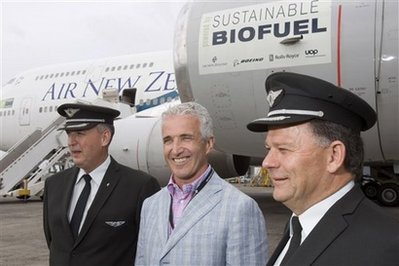Passenger aircraft testing vegetable gasoline
An Air New Zealand Boeing 747-400 heavy-duty aircraft yesterday successfully tested a 2-hour flight using a portion of vegetable fuel, a clean biofuel that helped cut harmful emissions and costs. .

Air New Zealand director Rob Fyfe and photographers before the Boeing 747-400 are preparing to test plant gasoline.Photo: AP.
One of the four engines of the aforementioned Boeing 747-400 runs on a 50/50 blend of fuel between vegetable gasoline extracted from Jatropha (picket stakes) and standard A1 gasoline. This event marks a year when airlines around the world promote the use of alternative fuels, amid rising oil prices earlier this year and the aviation industry is facing an economic downturn.
Air New Zealand has not made it clear whether the blended fuel is cheaper than standard gasoline because Jatropha is currently not mass produced, but the company says the price of this biofuel is "very competitive". Air New Zealand director Rob Fyfe rated the flight as "a milestone for the airline and civil aviation".
"Today we are standing in front of the first phase of sustainable fuel development and an important moment of aviation history , " Rob Fyfe stressed before the special flight departed. This is a joint project between Air New Zealand, Boeing aircraft manufacturer, Rolls Royce engine manufacturer and corporation specializing in alternative fuel Honeywell International.
Previously, biofuels were considered unrealistic for the aviation industry, because they were frozen at low temperatures when the aircraft was traveling on design altitudes. But tests show that oil extracted from Jatropha seeds has a lower freezing temperature than standard gasoline gasoline. This species is native to Mexico and lives in hot and humid climates.
Biofuels also emit as much carbon as petroleum-derived fuels, but gasoline made from Jatropha plants is capable of absorbing half of the carbon it emits. Therefore Air New Zealand proposed mixing with the 50/50 ratio of these two fuels to reduce 1/4 of the carbon compared to standard A1 gasoline.
The flight test of the Boeing 747-400 came from Auckland airport with normal flight conditions to check the specifications when using the blended fuel. It is calculated that at least until 2013 Air New Zealand can guarantee that there is enough fuel extracted from Jatropha to mix. The airline is hoping that by 2013, 10% of their flights will be partially made thanks to fuel mixed with vegetable gasoline.
Meanwhile, many other biofuels such as corn made from corn are accused of raising food prices and the issue is still controversial. But Jatropha may be the best solution because the family of this castor family does not compete with food or farmland because they can live on barren lands and need less water.
Last February, Boeing manufacturer and Virgin Atlantic also test flight by blending fuel between coconut oil and palm oil. But environmentalists think that this fuel is not practical because it is difficult to meet the demand for civil aviation.
- Passenger aircraft will run on sawdust and straw?
- Testing unmanned passenger aircraft
- Germany built supersonic passenger aircraft
- Video: A close-up of passenger aircraft landed in sandstorms
- How do passenger planes fly?
- Future supersonic passenger aircraft do not cause explosions
- Things to know about E5 gasoline
- The US company is about to build a supersonic passenger plane of 6,000km / h
- NASA designs supersonic passenger aircraft without causing explosions
- Passenger aircraft fly as fast as five times the speed of sound
- Testing the plane takes 46 minutes across the United States
- Ultrasound can rotate two ways
 Is the magnetic North Pole shift dangerous to humanity?
Is the magnetic North Pole shift dangerous to humanity? Washington legalizes the recycling of human bodies into fertilizer
Washington legalizes the recycling of human bodies into fertilizer Lightning stone - the mysterious guest
Lightning stone - the mysterious guest Stunned by the mysterious sunset, strange appearance
Stunned by the mysterious sunset, strange appearance